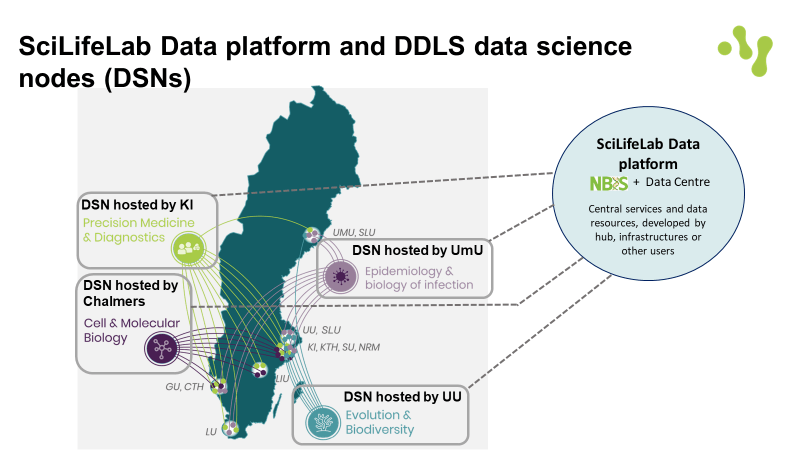Data Science Nodes and Data platform recruitment
The practice of life science is continuously becoming more data-dependent. The amount and complexity of data is growing exponentially, and more scientific discoveries are enabled when data is openly available to researchers across the world. This is the basis for the SciLifeLab and Wallenberg National Program on Data-Driven Life Science (DDLS), which now sets out on its mission to recruit and train the next generation of life scientists.
Quick links
Open positions (marked “Data platform” or “Data Science Node)

Interested in applying?
Accelerate the paradigm shift in life sciences
As a permanent staff member in the DDLS program, you will be part of the next-generation of data-driven life science and provide world-leading bioinformatics support, outstanding computational environments for research, and unique data services in life science in Sweden.
You will accelerate the data-driven paradigm shift in life sciences, and support researchers at the global frontline across a wide range of research fields, and also aid the establishment of advanced training programs for a new generation of life science researchers.
The Data Science Nodes and the Data Platform will help shape a research ecosystem of world-leading caliber
Advances in computational capabilities, AI, machine learning and other technologies, provide enormous new opportunities for unbiased ways to analyze data and to promote biological discoveries, insights on life as well as promote innovation and translate research into societal benefits. In order to realize these opportunities, the DDLS program will establish national Data Science Nodes with permanent staff members with leading expertise in for example AI, bioinformatics, systems development, data engineering, and data stewardship.
The Data Science Nodes will be located in connection to strong local research environments at leading Swedish universities, but at the same time be very tightly integrated in the national DDLS program and be part of SciLifeLab’s unique national networks for bioinformatics and research data.
The nodes will be working closely with the central SciLifeLab Data Platform on data services system development, and with the National Bioinformatics Infrastructure, NBIS, for bioinformatics support. With us, you take part in forming a strong, interdisciplinary community with researchers and technical staff working synergistically to create and explore resources and open data in life sciences.
You will also be connected to all of the SciLifeLab infrastructures – spanning technologies and expertise within everything from genomics, metabolomics and spatial omics, to drug development, diagnostics, single cell biology and bioinformatics – and the dynamic research community formed around it.


Connect with initiatives across disciplines and sectors
All DDLS Data Science Nodes will primarily focus on one of the four strategic research areas within the program (cell and molecular biology, precision medicine and diagnostics, evolution and biodiversity, epidemiology and biology of infection), but will interact within as well as across the areas. The DDLS program also promotes collaborations with industry, healthcare and other national and international partners – such as WASP (the Wallenberg AI, Autonomous Systems and Software Program, with the aim of bridging the life science and data science communities) and the Wallenberg Centers for Molecular Medicine (WCMM).
Permanent staff positions
SciLifeLab, DDLS, and the hosting universities consider advanced technical staff a key component of the future of life science, to provide competences and solutions that will catalyze ideas and ensure quality. All Data Science Node and Data Platform staff positions hosted at the higher education institutions and The Swedish museum of natural history (NRM) will be working under the umbrella of the SciLifeLab Bioinformatics Platform (NBIS) and the SciLifeLab Data Centre, with many years of an excellent track-record in establishing stimulating working environments, well-functioning team management, and individual professional development opportunities, already today encompassing a unique community of in total more than 150 technical staff across Sweden. tenured employment.
Why choose Sweden?
Support research in an innovation hotspot
Despite its relatively small population of around 10 million people, Sweden is home to some of the world’s best universities. It is ranked among the world leaders in higher education and its universities regularly place highly in global rankings like the Times Higher Education World University Rankings and the Shanghai Jiao Tong Academic Ranking of World Universities.
Sweden is recognized as one of the most innovative countries in the world. The emphasis on independent studies and the fact that Sweden’s investment in research is among the highest in the world in relation to GDP, are key reasons for that. The capacity for innovation has been built through a long-term focus on education, research and development, with both broad and specialized research. An active research policy has enabled Sweden to acquire leading positions in several areas, one of them being life sciences, and in 2018, the government created a life science office, dedicated to further promoting the field.
The spirit of innovation is strong, with initiatives at the cutting-edge of sustainable development and technological advancement, which is reflected in the higher education institutions, where you have the tools to drive development and can utilize the strong innovation ecosystem (offering support systems for both researchers as well as organizations seeking university collaborations).
(Read more: sweden.se, Higher Education and Research, Innovation in Sweden, Universities Aiming for Innovation)


Live a good life with your family near
According to the global job board Academic Positions, Sweden is one of the best countries in the world to live in as a student or researcher. They also state that “there’s no denying Sweden is a great place to work. Swedish employees have some of the world’s best vacation, healthcare, pension, and job security benefits. Combine that with several high-ranking universities and it’s easy to see why Sweden is a favorite destination for academics”.
For instance, you don’t have to worry about the cost of healthcare, childcare or your children’s education, as state subsidies make these and other aspects of life affordable, and many benefits are free of charge. Workers’ rights and equality are cornerstones of the labor market, and you have sickness benefits, 18 months of paid parental leave per child and job security when you return to work.
And not to forget, you always have nature close by. Lakes and deep forests, and depending on where you visit, everything from alpine peaks, midnight sun and northern lights, to rolling countryside, majestic coastlines, and archipelagos with windswept islands. Even in Sweden’s largest cities, nature is never far away.
(Read more: Uppsala University, Why choose Sweden?)
Want to know more about working in Swedish academia?
Check out sweden.se and the participating organizations’ websites:
About the recruitments
Over the years, the program aims to:
- Recruit 39 future research leaders as DDLS Fellows
- Recruit more than 60 permanent advanced technical staff at national Data Science Nodes and the national Data Platform
- Establish a graduate school for 260 PhD students in academia and industry
- Create 210 postdoctoral positions in academia and industry
All Data Science Nodes and Data Platform staff will be recruited to the participating organizations, enabling them to interact closely with local research and technology environments. At the same time, they will be connected to the national DDLS program, cultivating a strong, interdisciplinary community of staff members and researchers working with the rapidly expanding resources and needs of open data in life sciences.
All technical staff will be working under the umbrella of the SciLifeLab Bioinformatics Platform (NBIS) or the SciLifeLab Data Centre, both of which since many years have well established frameworks to ensure stimulating working environments, well-functioning team management, and individual professional development opportunities.
